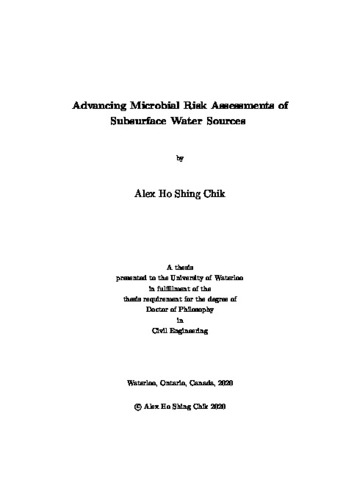| dc.contributor.author | Chik, Ho Shing | |
| dc.date.accessioned | 2020-07-14 14:57:55 (GMT) | |
| dc.date.available | 2020-07-14 14:57:55 (GMT) | |
| dc.date.issued | 2020-07-14 | |
| dc.date.submitted | 2020-06-12 | |
| dc.identifier.uri | http://hdl.handle.net/10012/16058 | |
| dc.description.abstract | Source water microbial quality evaluations are essential for the selection, design, and management of drinking water supplies. As biological sciences and technology continue to advance, how these assessments are performed will continue to evolve. In this age of “big data”, more data than can be meaningfully interpreted are being generated. Data generators and data analysts take on increasingly specialized roles to handle data from progressively complex tools. Drinking water industry decision makers are ultimately left with a frequently overwhelming task of choosing and deploying the best combination of tools from an ever-expanding repertoire.
This dissertation serves to inform a prudent level of microbial water quality monitoring, especially in subsurface water sources. The potential and limitations of existing and emerging microbial tools to support groundwater vulnerability assessments to fecal pathogen intrusion were explored. Approaches for handling microbial non-detects were critically reviewed; the value of increased sampling and method analytical recovery characterization efforts for improving the precision of mean microbial concentrations (and associated risk estimates) was also examined. A novel approach for elucidating patterns from biochemical data acquired during well purging was demonstrated, which maximizes the use of sequentially collected adenosine triphosphate measurements to gain insights about purging sufficiency for microbial water quality evaluation. Finally, the increasingly common use of a biomolecular method (16S rRNA gene amplicon sequencing) that may provide complementary, contextual lines of evidence in groundwater vulnerability assessments to fecal pathogen intrusion was evaluated. Overall, this dissertation emphasizes the need for consideration of the “fit-for-purpose” ability and the complementary use of existing and emerging microbial tools in these evaluations; no single tool can fully capture the elusive, multi-faceted nature of microbial water quality. | en |
| dc.language.iso | en | en |
| dc.publisher | University of Waterloo | en |
| dc.subject | microbial risk assessment | en |
| dc.subject | groundwater | en |
| dc.subject | adenosine triphosphate | en |
| dc.subject | dynamic time warping | en |
| dc.subject | 16S rRNA gene amplicon sequencing | en |
| dc.subject | groundwater vulnerability assessment to pathogen intrusion | en |
| dc.subject | sampling program design | en |
| dc.subject | microbial non-detects | en |
| dc.subject | microbial water quality | en |
| dc.title | Advancing Microbial Risk Assessments of Subsurface Water Sources | en |
| dc.type | Doctoral Thesis | en |
| dc.pending | false | |
| uws-etd.degree.department | Civil and Environmental Engineering | en |
| uws-etd.degree.discipline | Civil Engineering | en |
| uws-etd.degree.grantor | University of Waterloo | en |
| uws-etd.degree | Doctor of Philosophy | en |
| uws.contributor.advisor | Emelko, Monica | |
| uws.contributor.advisor | Schijven, Jack F. | |
| uws.contributor.advisor | Blaschke, Alfred P. | |
| uws.contributor.affiliation1 | Faculty of Engineering | en |
| uws.published.city | Waterloo | en |
| uws.published.country | Canada | en |
| uws.published.province | Ontario | en |
| uws.typeOfResource | Text | en |
| uws.peerReviewStatus | Unreviewed | en |
| uws.scholarLevel | Graduate | en |

